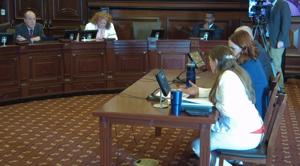(The Center Square) – State Sen. Bill Cunningham, D-Chicago, raised concerns about the proposed Compassionate Use and Research of Entheogens Act. The legislation would legalize the hallucinogen psilocybin for adult-supervised use in a licensed service center. for those 18 and older
During a recent Senate committee hearing, Cunningham pointed out that ketamine was eventually approved by the FDA, which is marketed as Spravato. Cunningham pressed a psychologist about the push to legalize psilocybin despite there being an FDA process.
“Is it just a sense that we aren’t going to get there? Is it impatience? Why not wait for the FDA process?” Cunningham asked.
Spravato is a hallucinogen used as an antidepressant for treatment of depression. The drug has to be administered by a physician. Psychologist Geoff Bathje testified that he would actually financially benefit from FDA-approval of psilocybin, but would rather not wait for the FDA process.
“This isn’t so much about getting ahead of the FDA as it is about recognizing that these medicines have thousands of years of safe cultural use outside of a medical model,” said Bathje. “Their effects are not just limited to treating diagnoses. [From research and anecdotes] their relationships improved, their ability to parent improved and their spirituality opened up.”
Cost estimates are that the FDA-approved version of psilocybin might be $40,000 for treatment per patient, according to Bathje.
Senate Minority Leader John Curran, R-Downers Grove, said the FDA process is slow and rigorous for a reason. He pressed state Sen. Rachel Ventura, D-Joliet, who proposed Senate Bill 3695, also known as the CURE Act.
“Your proposal is getting out in front of the FDA’s process, which is the normal process in the space of legalized therapeutic medications … Why 18?” said Curran. “There doesn’t appear to be some model legislation around the country. Other states are doing research, funding and clinical trials. I don’t see a coupling of the automatic expungement process with the other legislation. Yours is the only one. You’re trying to address mental health treatment availability. Why are you coupling that concept with this?”
Ventura said she proposed 18 year olds having access to psilocybin, and not alcohol or nicotine, because this drug shouldn’t be viewed as a drug but rather a medicine.
“If that [having the legal age of access be 18] is a hold over, I am happy to have that discussion. We are hoping to allow as many people as possible to utilize this because it could be the thing that saves their life, especially since we have seen an increase in teen suicide,” said Ventura. “On expungement, there are not a lot of cases in Illinois that would be expunged solely on the psilocybin-factor. The decriminalization aspect is really meant to maximize the benefit of research that can be done.”
The Illinois Psychiatric Society has opposed the measure.







